- Home
- J. Robert Kennedy
State Sanctioned Page 2
State Sanctioned Read online
Page 2
Kulick remained silent, sweat beading on his brow.
“It was that man. You recognized him. Who is he?”
Kulick sucked in a deep breath and squared his shoulders then lowered his voice. “His name is Vasily Boykov. He was removed from his position several months ago.”
Morrison’s heart hammered. “Why?”
Kulick lowered his voice further. “He spoke out against closer ties to the West.”
Morrison’s stomach flipped and the blood rushed from his face. “Then there’s no way he should be within the secure zone.”
Kulick agreed. “No, unless he’s been reinstated, but I find that hard to believe.”
Morrison shook his head. “No, something’s going on here. Our comms are jammed and we’ve got an ex-KGB agent within the secure zone.”
Kulick glanced around nervously. “What do you think is happening?”
“It has to be an assassination attempt.”
“Our General Secretary or your President?”
Morrison shrugged. “Does it matter? Either one could lead to war.”
Kulick turned a lighter shade of pale. “What do we do?”
Morrison looked about, someone shouting orders as the two leaders were only minutes away from beginning their “impromptu” walk to meet the “average” Russian. “We have to warn our people.”
Kulick threw up his hands. “But who do we trust?”
“Is there anyone on your side you can trust?”
Kulick shook his head. “Not really. This is the Soviet Union. You don’t really trust anyone. You survive longer that way.”
Morrison cursed. “What a way to live.”
Kulick glared at him. “And I suppose you trust everyone you work with?”
Morrison regarded him. “Until a few moments ago, yes. But now, I’m not sure. We’re all paired up. If someone let him into the zone, then at least one of our people is compromised.”
Kulick frowned. “Or dead. I just heard your voice on that radio.” His frown deepened. “In fact, how do I know I can trust you?”
Morrison’s eyes widened. “We’ve been together the entire time. If I was in on it, why would I press you on this guy? Why would I try to call it in?”
Kulick sighed. “You’re right, of course.” He stared at the distinct groups mixed in with security and handlers, “eagerly” anticipating bumping into the two leaders. “We have to do something.”
Morrison thought for a moment, wishing to God he had more experience. Then he smiled. “We might not know who to trust, but we know who we can’t trust.”
Kulick’s face brightened. “Boykov!”
“Exactly. We follow him, and see what he’s up to.”
Kulick’s hope faded. “But where did he go?”
Morrison strode with purpose toward the western end of Red Square, Kulick scrambling to keep up. “Well, while you were trying to avoid looking at him, I never took my eyes off him.”
“Where’d he go?”
“Down Ilyinka Street.”
Kulick sighed. “That’s good, then. The leaders aren’t supposed to go anywhere near there, and it’s closed off at the other end.”
Morrison wasn’t so reassured. “Yes, but look.” He pointed toward the GUM State Department Store. “That would give a sniper a clear view of the entire square, where they’re supposed to be walking in the next five minutes.”
“But surely they’d be spotted!”
“Perhaps, but by whom? We have no idea how many people are in on it.” He quickened his pace.
“I might have been mistaken.”
Morrison came to a halt and turned toward Kulick. “I thought you recognized him.”
“I did. Or at least I thought I did. Maybe I was mistaken.”
“You seemed pretty sure a minute ago.”
“I was.” He cursed in Russian. “I don’t know what to do. This is beyond my level of responsibility. Both of ours. We’re supposed to call it in, not investigate.”
Frustration at Kulick’s indecision had Morrison’s chest tightening. “We tried that.” He jabbed a finger at the buildings he had seen Boykov disappear between. “Are you coming or not?”
Kulick, trembling, shook his head. “I have to report this.”
Morrison growled in frustration. “Then go! Tell everyone you can!”
Kulick shook out a nod then sprinted toward the command post inside the Okhotny Ryad Metro Station at the far end of the square, Morrison resuming his jog to where he feared a sniper was taking up position. If the KGB were involved, that was one thing, but his own people? He would never have believed it if he hadn’t heard his own voice come over a frequency reserved for American personnel only. The Soviets had no access to the frequency, at least officially. If they were jamming it, then his people must know, and they’d be taking action.
Yet they weren’t.
Nobody was reacting to anything.
Security personnel he recognized were spread throughout Red Square, and none were showing the least bit of concern. It meant either his people didn’t know, which he found unlikely, or they were involved in whatever was going on, which he found impossible to believe. Why would anyone on his side of things want to assassinate either of the two leaders? Certainly, they wouldn’t want to kill Reagan. He was an incredible President, and was on his way out. If anyone wasn’t happy with him, the elections were only months away, and he’d be gone by January.
And Gorbachev? He was the best hope for peace, the best hope for ending the Cold War that had the planet on the brink of nuclear war for decades. If he succeeded in bringing in reforms, the world might finally find the peace it had been seeking for so long.
Why would any American want different?
He reached the street where he had seen Boykov disappear into, and came to a halt, listening for anything out of the ordinary, yet heard nothing. He took one last glance at the carefully staged square, then stepped between the buildings and out of sight. He reached for his weapon and cursed.
He was unarmed.
Only a limited number of American personnel had been approved for carrying, and he wasn’t one of them. Only those directly on the President’s detail were. His Soviet counterpart was, of course, armed, and was to have provided the firepower should it become necessary. It was one of the reasons given for every American agent having a Soviet double, and one of the reasons given for why the American side of the team had no need to be armed.
Nobody had thought what was happening right here, right now, could happen.
He advanced, his hands raised slightly in anticipation of having to defend himself, his ears straining for any indication someone was about to get the drop on him, but reached the end of the street, finding nothing out of the ordinary, just a physical security barrier blocking anyone from entering the square. Two uniformed Soviet officers stood to his left, another pair to his right, their eyes focused directly ahead. He took one step back, out of their line of sight, not willing to take the risk they’d simply arrest him and sort out later why he was unescorted in the secure zone.
And besides, there was no point in asking them if they had seen anything. If they had witnessed Boykov jump the fence, surely they would have challenged him. If he had attempted to evade capture, there would have been a commotion that would still be ongoing. And if he had papers to let him pass, then he was at least out of the secure zone.
But he didn’t believe that was the case. A man scaling a fence this high would be scrutinized, and these men, standing guard, appeared bored and tired. No adrenaline had rushed through their system in the past few minutes, the excitement of someone scaling a fence near their post certain to elicit a reaction.
It all meant that Boykov must still be within the secure zone. He turned, examining the street. There was only one door not barricaded, and it led into the Soviet government’s generic department store. It appeared to be a service entrance. He jogged back to it and tried the handle. It was unlocked. He had no idea whether t
hat should be the case, though if he were in charge of security, he would have had it locked, or at least guarded for the duration of the appearance by the leaders of the two most powerful nations in the world.
He pressed his ear to the door and heard nothing. He pushed it open slightly, peering into the darkness on the other side, spotting nothing, though the barrel of a gun could be pointed at his head right now, and his unadjusted eyes wouldn’t have seen a thing. Instead, he once again relied on his ears, and once again heard nothing.
He pushed the door open a little wider, sunlight from outside pouring in, and gasped. Two men were down, one with a bullet wound to the head, the other with two to the chest. He reached for his radio then cursed. It was probably still jammed, and if it wasn’t, whoever was behind this likely had a radio tuned to the same frequency, and he’d just be tipping them off that he was coming. He pushed the door wider and closed his eyes for a moment, saying a silent prayer for the American agent. He had never met him, but recognized him from the briefings and from training. He was his age, a year behind him at the Farm.
He knelt beside the Russian, patting him down, and smiled as he felt his weapon in a shoulder holster. He pulled the Makarov pistol and checked the magazine, then searched for spares, finding two. He slipped them in his pocket then disabled the safety. A set of stairs were to his left, a long hall ahead with at least a dozen doors and no personnel, the building deemed non-essential and evacuated for the duration of the visit.
It has to be the stairs.
If this was an assassination, then an elevated position would be advantageous. It would reduce the possibility of the shot being cut off by those surrounding the target. He took a tentative step up the stairs and winced as the well-worn tread creaked, yet pressed forward. He was committed now. If there was no one here, then he had nothing to fear, and if there was, they were responsible for the deaths of two agents, and were here to assassinate people under his protection, for reasons unknown.
As he climbed the staircase to the next level, his mind was racing as his heart hammered faster and faster, and he took a beat at the landing to force himself to calm down. Slow, steady breaths, in through the nose and out through the mouth, were repeated several times, and his nerves relaxed if only slightly, though it was already too late to prevent adrenaline from pumping through his system.
He silently cursed at his shaking hands, grasping the weapon with both, trying to steady his aim. He was a crack shot at the Farm. They all were by the end, otherwise they didn’t become agents. An agent who couldn’t shoot was useless in the field. And the simulations they had put them through were nerve-racking, but in the back of his mind he had always known it wasn’t real, and he couldn’t get hurt.
Here, today, he would likely die, and it had him on the razor’s edge.
He reached the second floor and discovered the door chained with a Soviet security tag hanging off it. He sucked in a deep, slow breath, then hurried up the next flight, discovering another chained door.
One more.
He reached the top and his heart hammered, the blood pounding in his ears at the sight of an unlocked chain. Not cut, but unlocked.
His foe had been provided with the key.
How deep does this go?
He pressed against the wall to the side of the door and listened, but it was useless, his pounding heart overwhelming anything that a calm, experienced agent might have heard.
James Bond wouldn’t be shaking.
He frowned.
Yeah, but Timothy Dalton would be quaking in his boots right now.
He smiled.
But maybe not Connery.
He drew another long, slow breath, closing his eyes as he rehearsed what was to come. He would open the door, slowly, listening for any sign of an adversary while scanning from left to right for a target. The building should be empty, and the guards were dead, so anyone he spotted shouldn’t be there, and was therefore the enemy.
Shoot first, ask questions later.
He inhaled again through the nose.
Just remember your training, and you’ll survive.
He pushed the door open, the hinges giving him away, sending his heart racing once again. He shoved with his shoulder, his weapon held out in front of him, gripped tightly in both hands as he scanned for a target, his arms swinging to his right as he stepped inside and away from the door. Something moved to his right and he dove deeper into the darkened room as the door swung shut behind him. He hit the ground as bullets tore apart the wall where he had been standing, the gunfire muted, his opponent using a suppressor. Rolling, he took aim at the shadows and squeezed off two rounds, the muzzle flashes briefly lighting the room enough for him to see his opponent break to the left and take cover behind a pillar.
He regained his feet and, remaining at a crouch, rushed behind his own pillar nearby. He pressed his back against the cool concrete, his chest heaving, sweat beading on his forehead and racing down his back sending a chill throughout his body.
“Hey, American. Why don’t you just leave and let me do my job.”
Morrison tried to steady himself, hoping his voice didn’t betray the terror that threatened to overwhelm him. “I was just about to say something similar. Surrender now, and I just might let you live.” He was impressed with how calm he sounded, at least to himself, then mentally kicked himself for being so bold. “I’m an American Secret Service Agent. Drop your weapon and come out where I can see you.”
The man laughed. “You’re CIA, Mr. Morrison, and this is the first action you’ve ever seen, and it will be your last.”
Morrison’s eyes shot wide.
How could he know that? How could he know my name?
The man’s English was good, though it dripped with a Russian accent. He couldn’t be sure if it was Boykov, but he took a chance. “And you are Vasily Boykov, former KGB, who may have seen more action than I have, but is a traitor to his country, and will die before this day is out.”
There was a pause then a chuckle. “I’m impressed, American. You’ve obviously been well briefed, though I doubt you would have seen my file, or recognized my face. My guess is your double recognized me.”
Morrison continued struggling to control his breathing and steady his nerves. If he managed to get a chance for a shot, he had to take it, without hesitation, and couldn’t miss because his nerves got the better of him. “You’re right. And my partner has gone to get help.”
“Help won’t be coming, my American friend. Your partner is either already dead, or already in custody. Nobody will be coming to save you.”
Morrison’s chest tightened. How deep or wide the conspiracy he had stumbled upon went, he had no idea, but it was enough to have provided the man access to this floor with a key, for the radio frequencies to be hijacked, and for Boykov to have gained access to the secure zone despite being terminated from the KGB.
His eyebrows shot up.
You don’t get fired from the KGB.
This wasn’t America where you could lose your high-security job and reenter civilian life for having expressed a political opinion. This was the Soviet Union. Here, if you expressed an opinion that went against the state, you disappeared. You were either executed or imprisoned. You weren’t shown the door. If this man had indeed spoken out against the state, then he should be in a gulag in Siberia performing hard labor. But instead, he was roaming the streets of Moscow.
His heart hammered.
He’s still with the KGB! They just wanted people to think he wasn’t!
And it made sense. How would a junior agent like his partner know what he knew unless the KGB wanted him to know? It was a cover. He shuddered.
That means the KGB, or at least elements of it, are behind this.
Yet none of that explained his frequency being commandeered, with his own voice recorded and played over the radio waves. Elements of the CIA or Secret Service had to be in on it as well. Either here, on the ground, or back stateside. They obviously had t
heir files. All their files, if Boykov recognized a lowly agent like himself.
No, there’s no way he’d remember me. My face, perhaps, but not my name.
And how did he know who he was? It was too dark in here.
He’s not working alone. They watched you come in!
His heart hammered.
More could be coming!
Something pressed against the back of his head and he cursed, his shoulders sagging. He held up his right hand with the gun, and it was removed by the second man it had taken him too long to figure out might be coming. He raised both hands, stepping from behind the pillar providing him with cover from Boykov, but also a blind spot this second opponent could use. He looked down at the man’s feet.
Socks.
He shook his head. “Good thinking.”
The man glanced at his feet. “I thought so.” The man’s English was perfect. If he didn’t know better, he’d have thought this man was as American as he was. He said something in Russian to Boykov.
I have to learn Russian.
Boykov stepped out from behind the pillar, the faint light coming in from around the drawn blinds of the windows lining the wall behind Morrison, revealing enough of his details to confirm it was indeed Boykov. “It’s about time.” He checked his watch. “They’ll be here any second.” He rushed to the window and opened a rifle case that had gone unnoticed sitting on a table. A sniper rifle was quickly assembled then positioned. Boykov lifted the blind slightly, perhaps two inches, enough to give him a shot apparently, though not enough for anyone monitoring the windows to notice.
The second man walked toward Boykov, keeping his weapon trained on Morrison. “Do you have the shot?”
“Yes, I see the bastard.”
“What color is his suit?”
Boykov kept his eye pressed against the scope. “Powder blue. His blood should show quite nicely for the cameras.”
“So, the target is Gorbachev. You crazy sons of bitches.”
It was a curious statement. Curious enough to break Boykov’s concentration as he turned to look at his partner. “What kind of—”

_preview.jpg) The Protocol (A James Acton Thriller, Book #1)
The Protocol (A James Acton Thriller, Book #1)_preview.jpg) Depraved Difference (A Detective Shakespeare Mystery, Book #1)
Depraved Difference (A Detective Shakespeare Mystery, Book #1)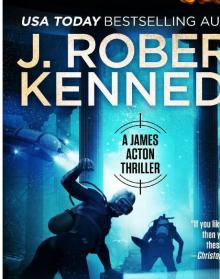 Atlantis Lost
Atlantis Lost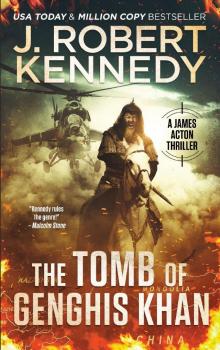 The Tomb of Genghis Khan
The Tomb of Genghis Khan_preview.jpg) Rogue Operator (A Special Agent Dylan Kane Thriller, Book #1)
Rogue Operator (A Special Agent Dylan Kane Thriller, Book #1)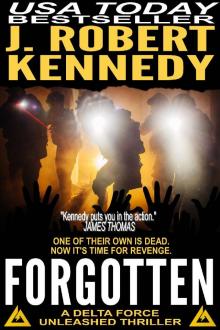 Forgotten
Forgotten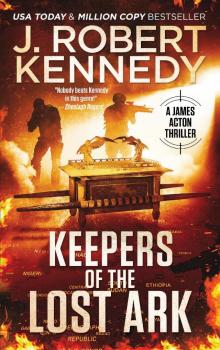 Keepers of the Lost Ark
Keepers of the Lost Ark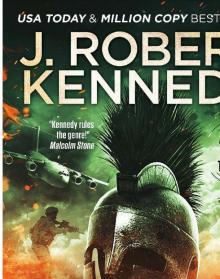 The Cylon Curse
The Cylon Curse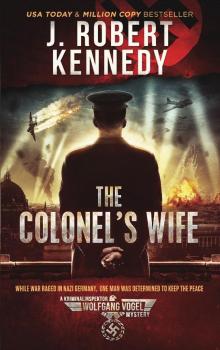 The Colonel's Wife
The Colonel's Wife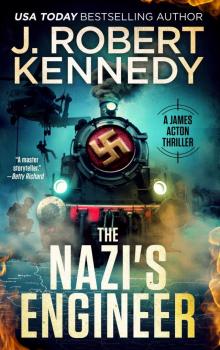 The Nazi's Engineer
The Nazi's Engineer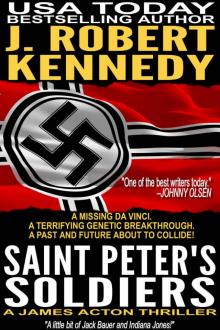 Saint Peter's Soldiers (A James Acton Thriller, Book #14)
Saint Peter's Soldiers (A James Acton Thriller, Book #14)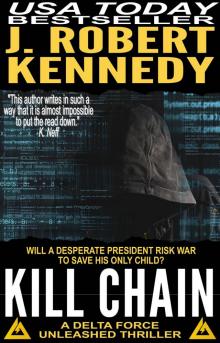 Kill Chain
Kill Chain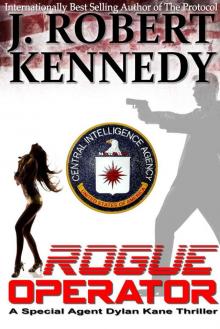 Rogue Operator
Rogue Operator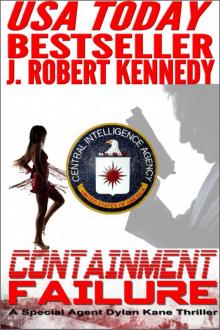 Containment Failure (A Special Agent Dylan Kane Thriller, Book #2)
Containment Failure (A Special Agent Dylan Kane Thriller, Book #2)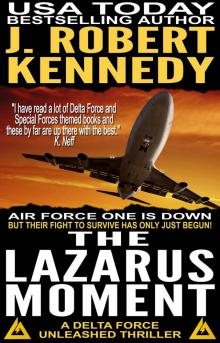 The Lazarus Moment
The Lazarus Moment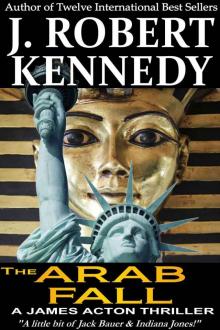 The Arab Fall (A James Acton Thriller, Book #6) (James Acton Thrillers)
The Arab Fall (A James Acton Thriller, Book #6) (James Acton Thrillers) Payback
Payback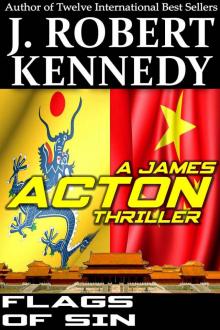 Flags of Sin - 05
Flags of Sin - 05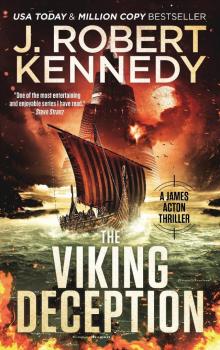 The Viking Deception
The Viking Deception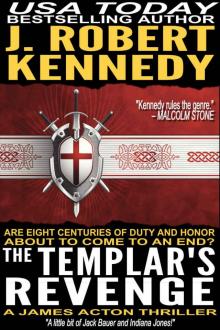 The Templar's Revenge (A James Acton Thriller, #19) (James Acton Thrillers)
The Templar's Revenge (A James Acton Thriller, #19) (James Acton Thrillers)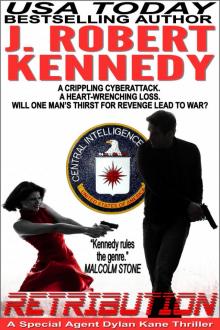 Retribution - A Special Agent Dylan Kane Thriller Book #7
Retribution - A Special Agent Dylan Kane Thriller Book #7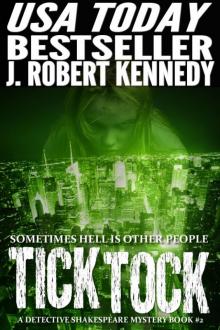 Tick Tock (A Detective Shakespeare Mystery, Book #2)
Tick Tock (A Detective Shakespeare Mystery, Book #2)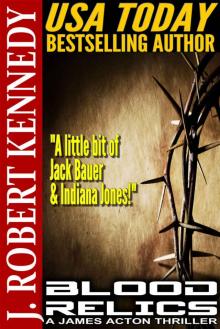 Blood Relics (A James Acton Thriller, #12)
Blood Relics (A James Acton Thriller, #12)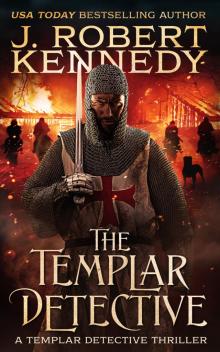 The Templar Detective
The Templar Detective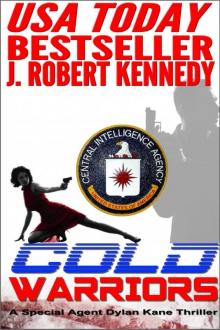 Cold Warriors (A Special Agent Dylan Kane Thriller, Book #3)
Cold Warriors (A Special Agent Dylan Kane Thriller, Book #3)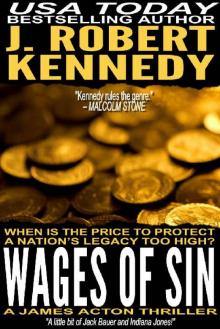 Wages of Sin (A James Acton Thriller, #17) (James Acton Thrillers)
Wages of Sin (A James Acton Thriller, #17) (James Acton Thrillers)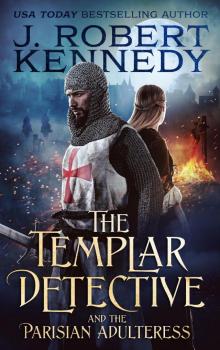 The Templar Detective and the Parisian Adulteress
The Templar Detective and the Parisian Adulteress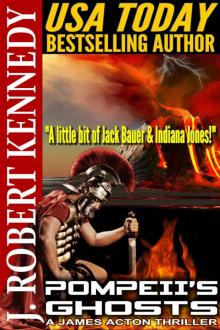 Pompeii's Ghosts (A James Acton Thriller, #9)
Pompeii's Ghosts (A James Acton Thriller, #9)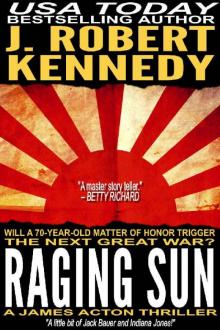 Raging Sun (A James Acton Thriller, #16) (James Acton Thrillers)
Raging Sun (A James Acton Thriller, #16) (James Acton Thrillers)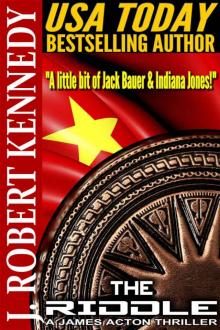 The Riddle (A James Acton Thriller, Book #11)
The Riddle (A James Acton Thriller, Book #11)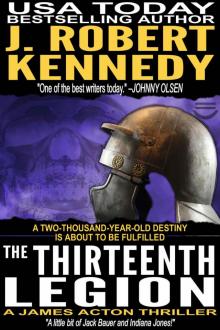 The Thirteenth Legion (A James Acton Thriller, #15) (James Acton Thrillers)
The Thirteenth Legion (A James Acton Thriller, #15) (James Acton Thrillers)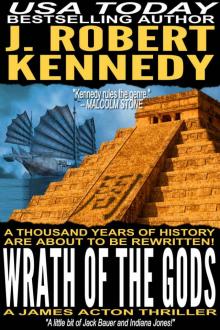 Wrath of the Gods (A James Acton Thriller, #18) (James Acton Thrillers)
Wrath of the Gods (A James Acton Thriller, #18) (James Acton Thrillers)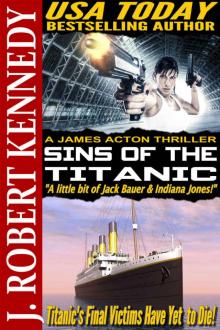 Sins of the Titanic (A James Acton Thriller, #13)
Sins of the Titanic (A James Acton Thriller, #13)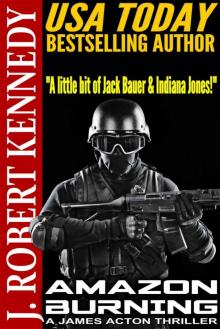 Amazon Burning (A James Acton Thriller, #10)
Amazon Burning (A James Acton Thriller, #10)